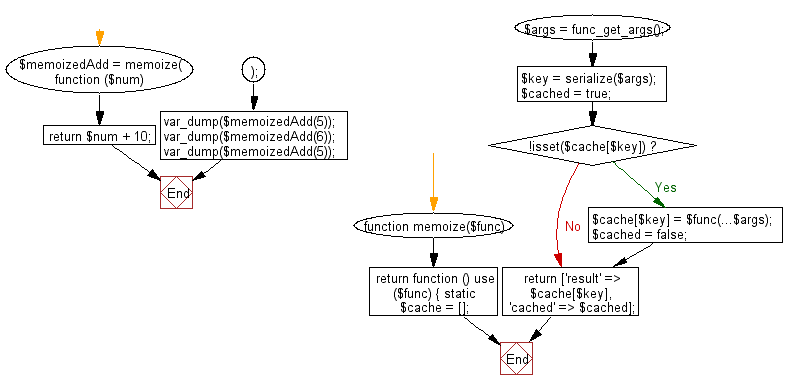PHP Exercises: Memoize a given function results in memory
PHP: Exercise-99 with Solution
Write a PHP program to memoize a given function results in memory.
Note: In computing, memoization or memoisation is an optimization technique used primarily to speed up computer programs by storing the results of expensive function calls and returning the cached result when the same inputs occur again.
Sample Solution: -
PHP Code:
<?php
//Licence: https://bit.ly/2CFA5XY
function memoize($func)
{
return function () use ($func) {
static $cache = [];
$args = func_get_args();
$key = serialize($args);
$cached = true;
if (!isset($cache[$key])) {
$cache[$key] = $func(...$args);
$cached = false;
}
return ['result' => $cache[$key], 'cached' => $cached];
};
}
$memoizedAdd = memoize(
function ($num) {
return $num + 10;
}
);
var_dump($memoizedAdd(5));
var_dump($memoizedAdd(6));
var_dump($memoizedAdd(5));
?>
Sample Output:
array(2) {
["result"]=>
int(15)
["cached"]=>
bool(false)
}
array(2) {
["result"]=>
int(16)
["cached"]=>
bool(false)
}
array(2) {
["result"]=>
int(15)
["cached"]=>
bool(true)
}
Flowchart:

PHP Code Editor:
Have another way to solve this solution? Contribute your code (and comments) through Disqus.
Previous:Write a PHP program to create a new function that composes multiple functions into a single callable.
Next: Write a PHP program to curry a function to take arguments in multiple calls.
What is the difficulty level of this exercise?
Test your Programming skills with w3resource's quiz.
PHP: Tips of the Day
How to Sort Multi-dimensional Array by Value?
Try a usort, If you are still on PHP 5.2 or earlier, you'll have to define a sorting function first:
Example:
function sortByOrder($a, $b) {
return $a['order'] - $b['order'];
}
usort($myArray, 'sortByOrder');
Starting in PHP 5.3, you can use an anonymous function:
usort($myArray, function($a, $b) {
return $a['order'] - $b['order'];
});
And finally with PHP 7 you can use the spaceship operator:
usort($myArray, function($a, $b) {
return $a['order'] <=> $b['order'];
});
To extend this to multi-dimensional sorting, reference the second/third sorting elements if the first is zero - best explained below. You can also use this for sorting on sub-elements.
usort($myArray, function($a, $b) {
$retval = $a['order'] <=> $b['order'];
if ($retval == 0) {
$retval = $a['suborder'] <=> $b['suborder'];
if ($retval == 0) {
$retval = $a['details']['subsuborder'] <=> $b['details']['subsuborder'];
}
}
return $retval;
});
If you need to retain key associations, use uasort() - see comparison of array sorting functions in the manual
Ref : https://bit.ly/3i77vCC
- New Content published on w3resource:
- HTML-CSS Practical: Exercises, Practice, Solution
- Java Regular Expression: Exercises, Practice, Solution
- Scala Programming Exercises, Practice, Solution
- Python Itertools exercises
- Python Numpy exercises
- Python GeoPy Package exercises
- Python Pandas exercises
- Python nltk exercises
- Python BeautifulSoup exercises
- Form Template
- Composer - PHP Package Manager
- PHPUnit - PHP Testing
- Laravel - PHP Framework
- Angular - JavaScript Framework
- Vue - JavaScript Framework
- Jest - JavaScript Testing Framework
